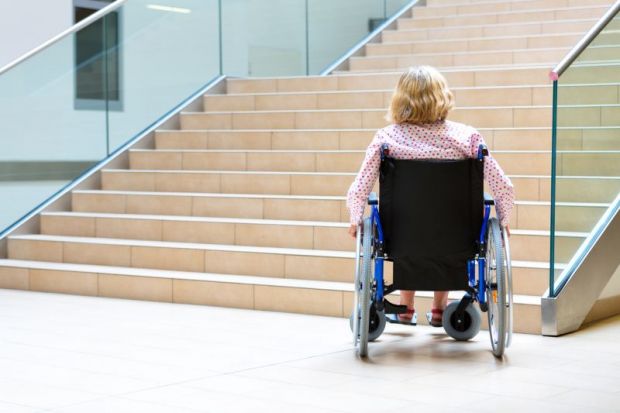Disabled staff at UK universities are made to feel that they are “unwanted” in their institutions and face considerable extra labour in organising their own support, according to a study.
The paper, which drew on 11 interviews with disabled staff at one university as well as insights from four of the authors, all of whom identified as disabled academics, found that disability was still viewed as “a medical problem”, rather than an issue that universities could help tackle by creating a more enabling environment.
Disabled staff were also “often made to feel that we were ‘misfits’ in the institution”, according to the research, and interviewees spoke about their “intense isolation, feeling that they had to manage alone, in order to prove themselves” in the competitive university environment.
The study, “The insider view: tackling disabling practices in higher education institutions”, published in the latest Higher Education journal, also details the huge amount of extra work that disabled staff take on to be able to carry out even the basic requirements of their job.
One interviewee said that they spend about “three full-time days a week” researching and booking their own travel, claiming their expenses from the university and then filing a separate claim through the UK’s Access to Work scheme, which provides support for disabled employees.
Another interviewee said that when preparing for a new teaching contract, “they requested the timetable before the start of the academic year, so that they could visit all the rooms to ensure they knew the route and had anticipated any possible problems” related to access.
This extra burden affects disabled scholars’ ability to succeed in an academic system that rewards “individual excellence”, according to the paper.
“If an individual cannot easily attend a conference or has to spend extra time and labour simply organising access to a building, then there is little time left for the production of high-quality research outputs,” it adds.
The authors said that they found themselves “not wanting to remain in academia, due to the frustrations outlined in this paper” and “not able to remain, since promotion and application processes have relied on a concept of individual meritocracy, unrelated to the realities of our working lives”. Only one of the four disabled authors of the paper still has an academic post.
While the interviewees were based at one university, the study said the problems were “universal issues which pervade the culture of higher education”.
Val Williams, emeritus professor of disability studies at the University of Bristol and one of the authors, said that disability is often seen “as a student issue” and “disabled academics are not valued as they should be”.
“A key issue that was highlighted in our paper was the individualism inherent in university practices: collective efforts and collaboration are not prized as they could be, in a situation where each member of staff has to provide evidence of their individual, personal achievements,” she said.
“Universities could change this, not just to make adjustments for disabled staff, but to review the value base that creates a competitive culture for all staff and students. Society more and more depends on cooperation, and disabled people are in a key position to be able to lead the way in helping the higher education sector develop approaches that value and reward collaboration.”




